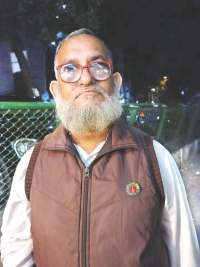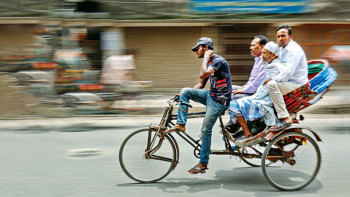An Unrecognised Hero

Md Jahangir Hossain moved to Dhaka City from his hometown in Barisal in the year 1977. The story of his labours are worthy of being shared with youngsters to learn about courage, loyalty and patriotism. Jahangir's tale is that of a hero. The heartbreaking part of his tale is that he is no longer treated like one.
“I felt the need to help achieve liberty for my 'Shonar Bangla' and so, I went to war,” says Jahangir with the same sparkle in his eyes that he had when he was just an18-year -old college student ready to fight for his country. “My family did not know when I went to get enlisted with my cousin for the war, because I knew they would be scared for me and would not support it. But I knew this was something I want to do- something I had to do.”
Jahangir remembers his first operation in the war like it happened yesterday. “We had our first confrontation with the Razakaars in Jessore. They were waiting to ambush us but we had gotten to them first. The 21 of us attacked and managed to kill 6 Razakaars. We were then told to go home to meet our families but only for a little while. My family broke down in tears when they saw me but they did not stop me from going back. By then they had realised how important this was for me, for us,” recalls Jahangir.
Jahangir was brave, there was no doubt. But his bravery was not for his own survival. His bravery was for his country's survival. “I was not scared. I didn't know that we would be liberated in December. But I knew we would be liberated. And I was ready and determined to fight no matter how long it took. There was no time for fear to take over.”
Jahangir and the others gave back their weapons in February 1972 when Bangabandhu had returned and received certificates, with General Osmani's signature, for their efforts in the Liberation War and were declared Freedom Fighters. Unfortunately, his certificate was lost in a flood.
After coming back to Dhaka, he had joined the Ansar and expected the special stipend for Freedom Fighters from the government. Even though he was a registered Freedom Fighter, they refused to give him his stipend due to the lost certificate. After suffering a stroke and becoming partially paralyzed, Jahangir had to quit the Ansar and he now sells tea at the Mukto Mancha, in Rabindra Sharabar, Dhanmondi while his wife has a stall where she sells cigarettes. The two now support their small family with this earning. Being one of those responsible for the freedom of Bangladesh, he should not only be respected, Jahangir should be celebrated as a hero. Many like Jahangir still belong to the lower socioeconomic background, deprived of the life they had hoped for after the war. Many like Jahangir, are still left to be the country's unrecognised heroes.


 For all latest news, follow The Daily Star's Google News channel.
For all latest news, follow The Daily Star's Google News channel. 



Comments